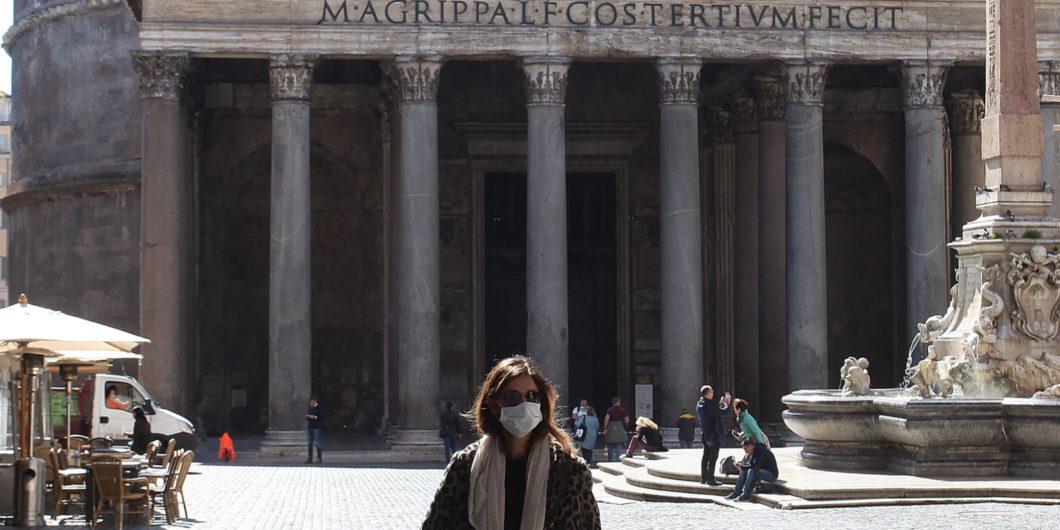The gold standard’s history reminds us that not every economic challenge demands a centralized political solution.
Pandemic and the Roman Foundations of Property
The maxims of Roman law—the fruit of centuries of case law—became the foundation of Western jurisprudence and moral teaching thanks to the wisdom of their ethical insights and the internal logic of the legal corpus they were part of. A substantial part of the legal thinking and moral teaching in the West is based on precepts of Roman law, as any educated person knows.
Let us consider two of those maxims, as they may help us navigate the crisis which has resulted from the current pandemic. First, the definition of property in Roman law included the right to use and abuse one’s own within the limits of the law: jus utendi et abutendi re suâ, guatenus juris ratio patitur. Second, salus populi suprema lex esto, or “the safety of the people shall be the supreme law,” was stipulated as early as the Law of the Twelve Tables (450 BC) and was restated by Cicero.
Taking them together, we see that Roman law granted property owners an ample sphere of discretion, yet property rights were not absolute: they were limited by law, with the safety of the community sometimes taking precedence over other considerations. Looking at how these principles are balanced in the modern world can give us some useful insight into economic flourishing and the policy response to our current pandemic.
Property Rights and Economic Flourishing
In modern times, Hayek taught us that economic efficiency is a result of an institutional setting under which individuals are allowed to benefit from their knowledge of particular circumstances. A regime of private property rights that grants ample freedom to individuals to dispose of what is theirs provides such incentives for wealth creation—so much so that we are forced to conclude that faster economic growth must be associated with greater freedom for individuals to interact as defined by the scope of the property rights they possess. In other words, those societies that firmly protect the first of our two maxims typically see greater economic flourishing.
A case in point is “Communist” China. There is no question that the Chinese regime is brutal, non-representative, and truly authoritarian. Their dictatorship may well have made the pandemic worse by their lack of transparency, intended either to save face or to intentionally impose the same economic pain they were suffering on the rest of the world. But the almost unbelievable creation of wealth that has taken place under its rule in the last 40 years is evidence that, regardless of other liberties they lack, the Chinese people have experienced, in certain respects, an expanded freedom to interact and greater assurance that they may keep for themselves the fruits of their efforts, even as the peoples of the United States and Western Europe have seen such rights curtailed the same period.
Counterintuitive as it may be, we may realize that this is indeed the case when we think of how many years it takes to get a license to build anything in the United States. The number of persons with “veto” power over what other people can do with their property—local officials, environmental agencies, district attorneys, leaders of neighborhood associations, and a plethora of other rent-seekers—is astonishing. “How, we ask, could our society have regressed to the point where a bridge that could be built in less than a year one century ago takes five times as long to repair today?” Larry Summers and Rachel Lipson pondered in a now-famous op-ed.
The fact is that western countries have an institutional setting that allows for less effective forms of human interaction and that is embodied, I argue, in weaker property rights than the ones we had a century ago or, recognizing the limits of such a claim, the ones emerging in China today.
Note that this is not an apology for authoritarian regimes, as I, for one, think that only a truly representative regime can, in the long run, protect individual rights, including property rights. The Faustian bargain offered by dictatorships makes for precarious protection of individual rights, and the aftermath of the current crisis may show us that. The fact remains, though, that China and the West have been moving in opposite directions when it comes to property rights in the last several decades. Both economies are reaping the rewards of their choices, and that should give us pause.
Property Rights and the Pandemic
That brings us to our current predicament. As the lockdown measures in the United States extend to more than seven weeks now, the media has been crowded with articles on how a lot of people are taking, apparently, a cavalier attitude towards the protective measures meant to prevent the spread of the coronavirus.
Are these people doing so because they are ill-informed or do not know how to use their freedom? Is it not a moment for us to rethink the idea of freedom and free markets during uncertain times like the current one? These seem to be very interesting questions to consider, especially in light of the situation in New York City and the various responses to the pandemic. In trying to make sense of that, I will offer some initial thoughts before returning to the question of property rights.
One may recognize the prerogative of the state to reduce protections of property rights, but these powers are to be used sparingly if the state is to keep the legitimacy that comes from upholding the rule of law.
To be alive is to risk death. Anything you do in life carries a certain risk of death (taking a shower, taking a bus, eating a snack, etcetera). Different people, in different circumstances, have a different risk “preference.” For instance, Adam Smith wrote in The Wealth of Nations that the pay of sailors and soldiers was low at his time because young people tend to be less concerned with risks. Furthermore, if you have money to buy food for you and your family and to pay your rent you are more inclined to stay home than if you do not. This is yet another reason for leaving individuals free to manage their property (and physical bodies) in the way they see fit.
So people may more or less rationally expose themselves to the risk of contagion, either because they have a low perception of risk or because they cannot afford to evade the risk. We should not say that people are “failing” to recognize the risks. We should say that their estimation of the risk (rightly or wrongly) leads them to take their chances, and that is an individual decision.
But the government has a responsibility for public health that trumps individual preferences. The salus populi maxim may help us here. The practical consequences of that maxim were, for example, that in case of a city fire, it was legitimate for the Roman state to burn a house to prevent the fire from spreading further, and the owner was not entitled to compensation. In case of an epidemic, it was deemed legitimate for Rome to quarantine the affected population. There are cases reported in our sources of people who starved to death inside of walled cities because such measures were applied heavy-handedly.
What we are seeing today is that governments all around the world are leaving very little room for individuals, health providers, and local governments to make their own decisions. The monopolization of testing, the licensing of new therapies, the extension of the confinement, all indicate that governments aren’t interested in balancing the salus populi principle with the jus utendi principle of individual property rights. If you add to this the politicians’ compulsion to signal that they are doing “something,” you can see the incentives to overreach and with that, to defenestrate any cost-benefit analysis.
Someone coming from a poor area is more likely to understand that some people simply do not have the wherewithal to stay home a month or two without work. There are people who, if they do not work, will not eat that day. It is clear that driving cars kills millions of people every year around the globe, but would we force people to stop driving cars if doing so is their only way to put food on their table?
The coronavirus is not like the fire spreading through ancient Rome. Its risks have been greatly exaggerated by models that assume people do not change their behavior spontaneously in response to perceived changes in the environment. This year, the number of deaths from all causes, and those just of respiratory diseases, in comparison with recent years confirms that. In the USA, for instance, so far this year, the deaths from all causes are just about what would be expected from the death rate in 2017-19. And in any event, in the absence of the possible invention of a vaccine (something for which we cannot afford to wait), there is really no other way to reduce mortality in the long run than by developing herd immunity.
Moreover, the authors of a recent paper using parameters from the pandemic in the US concluded that the economic devastation we are experiencing could be greatly reduced with no statistically significant increase in mortality if the lockdown were restricted to the elderly.
So, what to do? The only sensible thing for anyone trained as an economist, as a lawyer, or a social scientist is to call attention to the fundamentals of physical and social realities and try to help people to make sense of what is going on. Many people may then realize the madness of destroying the livelihood of so many, and start working to minimize this tragedy by lifting the lockdowns and establishing pro-growth policies moving forward.
A Golden Mean
Since Roman times, property rights have never been absolute. Still, there is a golden mean between the right to “use and abuse” one’s own property, and the extended “veto” powers that governments are exercising over one’s property today. That balance may allow for a more efficient satisfaction of human needs than what we have today. One may recognize the prerogative of the state to reduce protections of individual rights, including property rights, in cases the safety of the community so requires, but these powers are to be used sparingly, and for the shortest time possible, if the state is to keep the legitimacy that comes from upholding the rule of law.
Unwisely, in the last few months, we have burdened society with debt and created immense economic dislocation in an attempt to fight what we did not know how to fight (though we should have known, since plagues are as old as humanity).
Now it is time to reduce the costs of the production of new wealth, which will be sorely needed in the years to come. The way to allow for this greater wealth is to reestablish the balance between salus populi and jus utendi by reducing regulations and allowing broader rights to property ownership of everything, from land to ideas.



